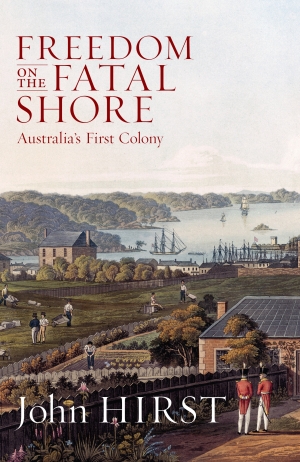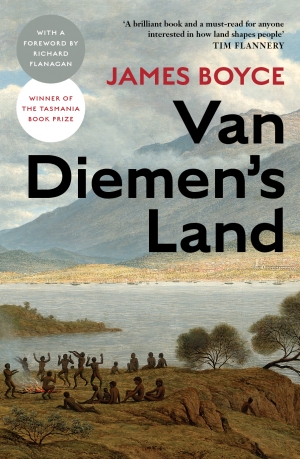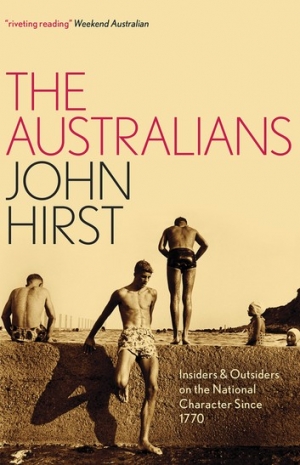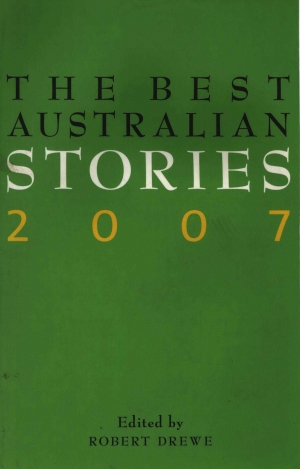Black Inc
Freedom on the Fatal Shore brings together John Hirst’s celebrated works on the early history of New South Wales: Convict Society and Its Enemies, first published in 1983, and Strange Birth of Colonial Democracy, published in 1988. Both books have been out of print for some time; the chance of picking up a second-hand copy is almost nil. Black Inc. has done historians, students and general readers a great service with this combined volume. Convict Society and Strange Birth have an intellectual symmetry that justifies their union.
... (read more)This book is dedicated to all Asian Australians. Like the term ‘Chinese Australian’, ‘Asian Australian’ is revealing to my baby-boomer generation of Australian-born Chinese, for we have lived most of our lives known as Australian Chinese, a term that stresses our ethnic background over our Australian birthplace, even though our families have contributed to Australia for four, five or six generations. We may not speak a word of our ancestral tongue, and may never have trod the land of our forebears. The new term recognises that the growing numbers of Australians of Cambodian, Chinese, Indian, Korean, Malay, Thai, Vietnamese and other Asian heritage are equally Australian as are white Anglo-Celtic Australians.
... (read more)Henry Lawson epitomised the weather-beaten laconic when he said: ‘Death is about the only cheerful thing in the bush.’ A century later, Bill Bryson, in Down Under (2000), picked up where Lawson left off: he defined the ‘real Australia’ as places where ‘no sane person would choose to live’. Somewhere in between, Patrick White created one of those dubious entities, a sweat-stained eccentric in an undaubed slab hut who told the explorer Voss that the country ahead of him was all stones and thorns, a place where anyone crazy enough to go out there might celebrate a ‘high old Mass ... with the skull of a blackfeller and his own blood’.
... (read more)Patrick Allington reviews 'Exit Right: The unravelling of John Howard' by Judith Brett and 'Poll Dancing: The story of the 2007 election' by Mungo MacCallum
Since the November federal election, kicking John Howard while he’s down has become something of a national pastime. While Howard’s take no-prisoners-except-on-Nauru behaviour has now exposed him to gleeful mass taunting, the idea that the end of his resilient political career has instantly created a noble Australia, its citizens and institutions cleansed and renew ed, is wishful thinking. In this context, Judith Brett’s new Quarterly Essay injects some welcome clear-headedness. Brett rains blows on Howard, but she is not a Howard-hater in the counterproductive and grandiose style of, say, Phillip Adams. Instead, she takes aim at the former prime minister in a characteristically nuanced and astute way. She bridges a gap – too often in Australia, a gulf – between scholars and interested laypeople, offering prose that is accessible and lively but that avoids dumbing down complex issues.
... (read more)John Rickard reviews 'The Australians: Insiders and outsiders on the national character since 1770' edited by John Hirst
Back in 1981, Richard White, in his seminal study Inventing Australia, dubbed the Australian concern with defining national identity ‘a national obsession’. It was a time when ‘the new nationalism’ associated with John Gorton and Gough Whitlam had reignited debate about anthems, flags and the paraphernalia of nationhood. The converse of this fixation has been the recurrent fear that the ‘cultural cringe’ has still not been laid to rest.
... (read more)Rosemary Sorensen reviews 'The Best Australian Stories 2007' by Robert Drewe
What can we make of the fact that, of the forty-seven stories selected by Robert Drewe for this year’s The Best Australian Stories collection, thirty-three are written in the first person? The influence of Creative Writing classes has to figure in any stab at an answer. It would be interesting to do the rounds of the universities to discover whether the teachers of such courses actively encourage the use of ‘I’, or if it happens obliquely, resulting from the way that writing exercises are structured. One wonders, too, if that old saw, ‘write what you know’, is discussed in the first week of these courses, and if such a practice contributes to the writer’s feeling more comfortable and secure when deploying the first person.
... (read more)If the central, not-made-much-of miracle in Craig Sherborne’s remarkable memoir Hoi Polloi (2005) is the disappearance of the narrator’s childhood stutter after a blow to the head, then the equivalent motif in Muck, Hoi Polloi’s equally fine sequel, is his voice.
... (read more)Patrick Allington reviews 'His Master’s Voice: The corruption of public debate under Howard' (Quarterly Essay 26) by David Marr
The continued success and quality of the Quarterly Essay series has done much to promote the long essay as a legitimate forum for detailed, informed and accessible political discussion. That this has occurred during the Howard era suggests that all is not lost in the quest for genuine public debate. In the latest Quarterly Essay, David Marr acknowledges that, ‘[s]uppression is not systematic. There are no gulags for dissidents under Howard.’ Nevertheless, His Master’s Voice is born of, and fuelled by, exasperation. Marr makes little effort to mask his personal enmity towards John Howard. And his disgust at the manner in which the federal Coalition has governed for more than a decade is palpable: ‘Since 1996, Howard has cowed his critics, muffled the press, intimidated the ABC, gagged scientists, silenced non-government organisations, neutered Canberra’s mandarins, curtailed parliamentary scrutiny, censored the arts, banned books, criminalised protest and prosecuted whistleblowers.’
... (read more)‘The nearest thing on earth to a Black Australian is a White Australian, and vice versa,’ observed novelist and poet Randolph Stow some years ago. Nicolas Rothwell might have pondered the idea on his more recent wanderings as northern correspondent for the Australian. His north is not simply geographical. It fans south and west from Darwin, and east as far as Arnhem Land. Its core is in the Centre, in the Aboriginal realms of the Western Deserts: not only another country, but also, in the book’s closing phrase, ‘another time’, another dimension to the Australia we think we know. In a tribute to Darwin’s fabled Foreign Correspondents’ Association (whose members are forbidden to file the crocodile stories that southern editors want), Rothwell quotes a Latin motto, ‘Austrem Servamus’ (‘We serve the South’). It’s a droll reminder of how far the correspondent’s words must travel, through a dirty and imperfect lens, to reach from one place to the other. The mediation of numinous, heavy-laden revelations from this remote other country for mainstream consumption elsewhere is the high-wire walk of this book.
... (read more)Story collections, especially ones that appear annually, hold out shimmering, Brigadoon-like hopes for their readers: that they will offer a snapshot of the times; capture the collective unconscious of a nation and its writers; and, if selected by a well-known writer, reveal something profound about that author’s tastes. Most editors will tell you that the reality is often different. Their wish-list of writers may have published little to select from that year, and have nothing in the bottom drawer when asked; well-known authors, approached on spec, may offer work that is sub-par but which the editor now feels obliged to take. Thus an anthology may end up as more of a compromise than an ideal selection. On the other hand, some anthologies, such as Kerryn Goldsworthy’s Australian Love Stories (1996), Drusilla Modjeska’s Sisters (1993) or the first two volumes of the long-defunct Picador New Writing (1993–94), have managed to pull off precisely this era-defining gathering of collective energy, showcasing our nation’s literature at a high-water mark. In such anthologies, there is a joyful sense of momentum and confidence: the pieces speak to one another with an almost predetermined charge.
... (read more)









